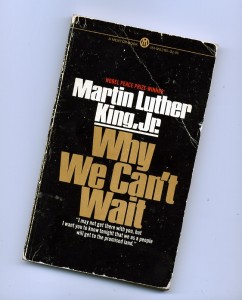#426 – Dick Bernard: Labor Day 2011 and "The Help"
We went to the film, The Help, Sunday afternoon. It was time very well spent.
There are many reviews: Go to IMDB for many of them and other information about The Help. If you haven’t seen the film, consider taking it in, either in the theater, or by other means.
The Help is about Jackson, Mississippi, in 1963, and about relationships, such as they were between Negro domestics and the families they worked for.
Sitting behind us in the Grandview Theater in St. Paul were two women who commented back and forth from time to time.
During the film, one of them said to the other, “that’s the way it was“. She apparently was from 1963 Mississippi, or perhaps even Jackson, the setting for the film. They sat there through the film credits at the end so I saw them as we exited: two older white women, my age.
1963 was a watershed year in the Civil Rights movement, captured best by Martin Luther King Jr in his book “Why We Can’t Wait“, published in early 1964, after the assassination of President John F. Kennedy. This book is an excellent companion for the movie. It is a book I go back to frequently.

Our guest for the movie was Cathy’s long-time friend, “Annette”, who I wrote about in December, 2009.
Back then, 21 months ago, she’d just been fired from her job in a bank for what turned out to be no reason other than the new manager wanted somebody else.
There was no need for a justifiable reason, as those domestics so well knew in 1963.
Annette is Black, single, in her 50s, probably 30-years or more an American citizen, raised in one of those tiny Caribbean resort islands.
Her family was not a family of domestics, but nonetheless knew their place and their roles back home. She is a neat person.
She said she enjoyed the movie, but she was uncharacteristically quiet.
I didn’t know till afterward that she’s unemployed again.
After over a year of unemployment which included knee replacement surgery, she finally found a job at the Twin Cities International Airport. It was a long bus ride, then eight hours on her feet in one of those food concessions in a concourse. It was scarcely above minimum wage. She had hoped to make 12 weeks, but she finally quit the job after only 10 weeks, last Friday. Her legs just couldn’t tolerate the punishment of standing all day.
So, she spends Labor Day joining the ranks of the unemployed again.
Annette won’t be out on any picket lines today or ever. It’s not her nature, and besides she can’t physically do it. She may end up going back to the island where she at least has family, she said.
“Good riddance”, some might say.
Meanwhile, our country lurches into a permanent election season, candidates braying about this or that as they seek office in 2012.
Ours, like increasing numbers of American families, has long-term unemployed among our own members.
Unless there is serious action, there will doubtless be more as the months go on.
Finally, in “The Help”, the domestic workers get mad as hell, unite, and their cultured and genteel overseers get their due.
But The Help is only a movie about a novel.
Rather than expecting today’s unemployed to advocate for themselves, or go out and get a job that doesn’t exist, we need to do the heavy lifting, politically.
In the long run, those without means will exact their revenge: our economy will get weaker and weaker because there is less and less money to spend. None of us will escape.
We don’t need this to happen. It’s in our court.
END NOTE: The film caused me to seek out an old Reader’s Digest article I knew I had saved, written by Mary Hatwood Futrell, daughter of a “domestic”, and then President of the over 2 million member National Education Association. The article is here: FutrellRdrsDigJul1989001
POSTNOTES:
If nothing else, this film should encourage reflection and discussion.
1. My personal knowledge of “Negroes” did not begin until Army days in 1962-63. I grew up in North Dakota before the military bases, and the race-of-choice was “Indians” who were restricted to Reservations and hardly respected. By chance, at the time of Martin Luther King’s “I have a dream” speech in Washington D.C., I was in an Army division on maneuvers in rural South Carolina. It was there, for the first time, that I saw first hand the separate and unequal division of the races in the south. It was an eye-opening experience to say the very least.
2. The film has also caused me to reflect on growing up in a public school teachers family in the rural midwest in 1940s and 1950s. Succinctly, in those ‘good old days’, teachers were treated with scarce more public respect than the domestics in the film. The significant difference, of course, was that racial animus wasn’t part of the equation. Public School teachers, before collective bargaining, were Public Servants (caps intended) – officially and publicly respected, but dismissed at will. Their travails were very small compared with the plight of the Indians and Negroes, but they were travails nonetheless.

Leave a Reply
Want to join the discussion?Feel free to contribute!